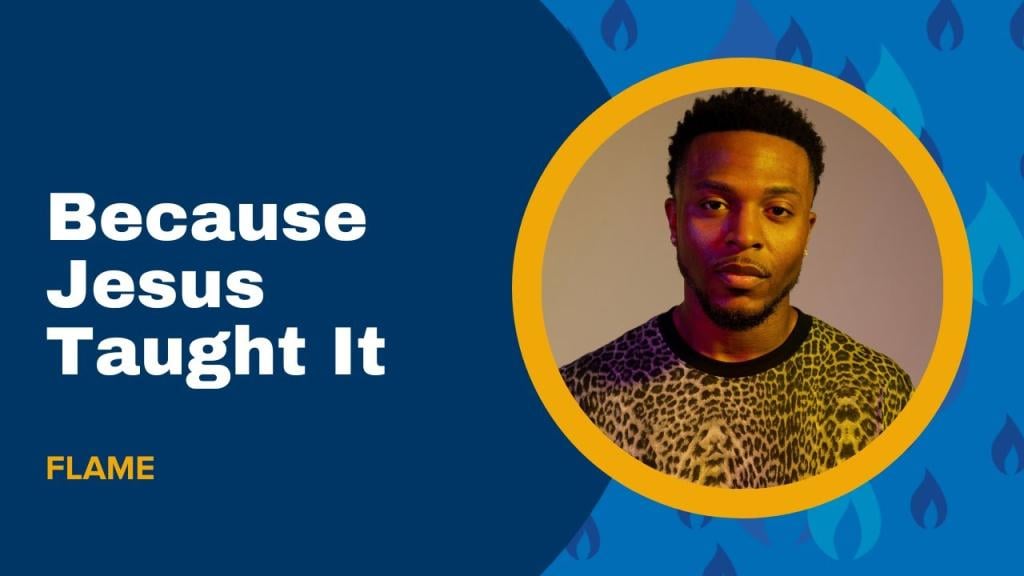I have blogged quite a bit about Flame, the stage name of Marcus Gray, the Christian rapper who has become a confessional Lutheran. (See our posts here and here and here and here.)
Flame tells his story in his excellent, inspiring book from CPH entitled Extra Nos: Discovering Grace Outside Myself.
Well, Flame has written another book that has just come out from CPH: . It’s about the church fathers, not in an academic church-history kind of way, but as offering a model of a sacramental faith that can energize contemporary Christianity and deepen the spiritual lives of contemporary Christians.
Flame illustrates all of this by telling about his own life, his experiences in various church traditions, and his spiritual struggles. Desiring a deeper study of the Bible and living in St. Louis, Marcus (I’ll call him by his student name) signed up for the non-pastoral M.A. in Religion track at Concordia Seminary.
One of the things I came away with from reading about Marcus’s seminary experience is a deep appreciation for our seminary professors. They come across as not only learned and theologically solid, but also as really good teachers with a pastoral heart for their students. Marcus tells how his classes and the personal interactions he had with his professors opened up the Gospel for him and changed his life.
I was asked to write an endorsement for his new book, which I was glad to do. Here it is:
” This sounds like a book about ancient Christianity, but even more than that, it is about contemporary Christianity-with its perfectionism and endless self-scrutiny-and our desperate need for the Sacraments. FLAME’s joy in discovering the efficacy of Baptism and the real presence of Christ in the Lord’s Supper, as found in the church father’s works and carried over into Lutheranism, is exhilarating and contagious. This seminary-trained rap star makes an engaging case for a faith that is both evangelical and sacramental.”
Let me give you a few samples from Because Jesus Taught It:
On the Sacraments and the Gospel
“Because some Christians in the contemporary context have turned the Sacraments into outward signs or metaphors pointing to what Jesus did long ago, we are positioned to look to ourselves in a way that is unnatural to Christian history. We now feed our God-given appetite, one that He placed in us, with a meal God has not prepared for us: our own fruit. Rather than feeding on and finding satisfaction in Christ’s body and blood given for the forgiveness of sins, in the bread and the wine, we feed on our personal improvement. Rather than finding relief for our souls in the waters of Baptism, we soak in our spiritual growth and ability to climb up the moral ladder toward heaven to find assurance” (pgs. 16-17).
On contemporary evangelicalism
“My premise is that the overthrowing of the Sacraments left a void in the church. The natural space in our hearts or in our Christian experience to connect with God through His ordained means and to unite with something bigger than ourselves was left empty. Nevertheless, we continued to have unfed appetites for a supernatural encounter with our Creator. Since the Sacraments were stripped of their relevance in our everyday understanding of the faith, in our joys and sufferings, we then sought to have that void filled by other things like high church attendance and church growth programs, misuses of the gifts of the Holy Spirit, down to borrowing from Eastern religions” (pg. 171).
On the church fathers
“This is not to say that there is perfect agreement in every little thing among the early church fathers and their writings. There certainly are differences, both subtle nuances and strong points of disagreement on certain matters between those early teachers of the church. Yet this is not the case concerning baptismal regeneration or the nature of the Lord’s Supper. There is an airtight unity among the church fathers related to God’s work in Baptism and Jesus’ bodily presence in the bread and wine” (pgs. 130-131).
Because my advance-copy .pdf does not allow for copy and pasting and to avoid having to type out passages from the book, I’m lifting these quotations from another review of Flame’s book by Amy Mantravadi, which is worth reading in itself.
She comments, “Because Jesus Taught It is unlike any other theological book I have read: part examination of the church fathers, part defense of Lutheranism, and part memoir, with occasional rap lyrics and Facebook posts.”
That unique communication style may well break through to today’s social-media oriented, pop-culture saturated mindset. Though seasoned adults will appreciate the book greatly, I can see it being especially compelling for teenagers, college students, and other young adults. Churches should buy boxes of this book for youth groups, high school Bible classes, and young adult book studies.
“I know of one rapper turned theologian,” concludes Mantravadi. “I know of no theologians turned rappers.”
Here is Flame talking about his new book in a YouTube video from Concordia Publishing Company:
I’m taking this post out from behind the paywall in hopes of spreading the word about this resource.














